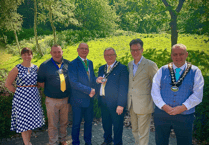Natural Resources Wales (NRW) is advising fisheries and anglers to take extra care when fishing for salmon in high temperatures, and to stop where water temperatures reach 20 degrees celsius.
As a cold-water species, salmon are known to be stressed by the kind prolonged hotter weather that Wales is currently experiencing.
Where water temperatures reach 18-20 degrees, NRW is advising anglers to take extra care while fishing for salmon. Salmon and sea trout start to feel the effects of these warmer temperatures and are slowing down.
As such, anglers should fish earlier in the day or late evening when the water cools off. The fish should be kept wet at all times and should not be removed from the water to be weighed or photographed. NRW is also advising anglers to be patient when releasing the fish as they may need more time to revive to swim off strongly.
When temperatures top 20, NRW is advising that it is too hot for salmon and sea trout and that anglers should stop fishing. Mortality chances are high for salmon and sea trout at these temperatures, even with a proper catch and release technique.
Current Wales byelaws require any salmon or sea trout that is caught to be released safely into the water, using good catch and release principles.
Dr Ben Wilson, NRW Principal fisheries Advisor said: “Salmon and sea trout are iconic species in Wales and are valued by anglers and the wider public as indicators of a healthy river environment. But, put simply, there are not enough adult fish returning to our rivers to sustain stocks at their current levels or to prevent further decline.
“With mortality chances being much higher for salmon and sea trout in hotter temperatures, anglers need to consider whether they should be fishing at certain times during hotter weather.
“We know that water temperature has topped 20 degrees in parts of Wales recently; particularly in the River Wye and the Usk, so we advise against fishing for salmon or sea trout in these rivers until water temperatures have cooled.”
“We recommend that anglers keep in touch with their local association or club, or to use a water thermometer to make sure it is appropriate to fish.”
Learn more about good salmon catch and release practice here.





Comments
This article has no comments yet. Be the first to leave a comment.